Fighting stage 4 breast cancer: New mum shares her story while still in chemotherapy
When Snehal Ponde moved to Singapore in 2019, dealing with breast cancer was not part of the plan. She tells CNA Women how she grew out of her self-pity and rekindled her love for coaching – even though her treatment hasn’t been going as well as she’d hoped.
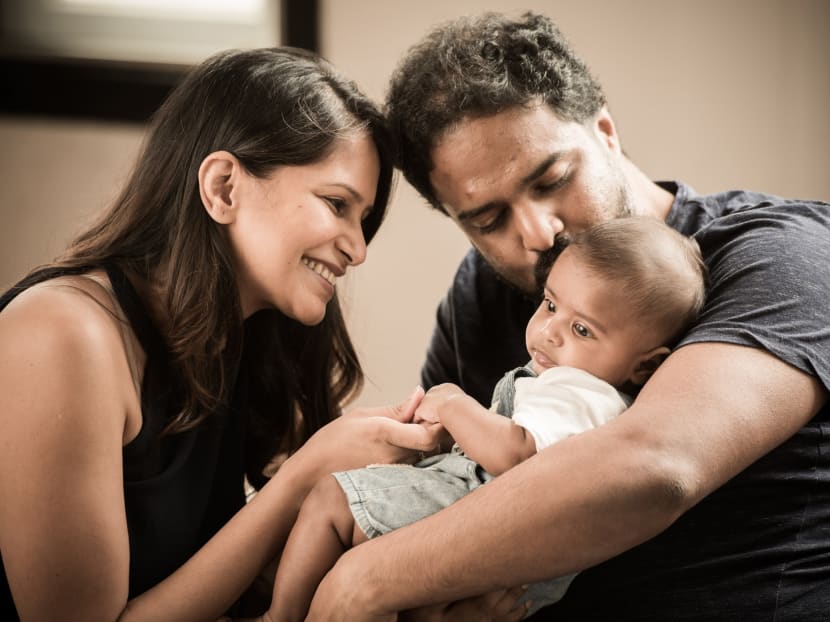
Snehal Ponde was five months pregnant when she and her husband moved from India to Singapore in 2019. (Photo: Snehal Ponde)
Snehal Ponde seemed to have the next phase of her life figured out. She was then living in Mumbai, India, and happily married. She was thriving as a human resources professional too, a job she had had for 13 years.
In August 2019, an opportunity of a lifetime came when Ponde’s husband was offered a permanent job in Singapore. At the same time, the couple found out that, after being married for two years, Ponde was about three weeks pregnant with their first child.
Excited by the prospect of starting a new life in a new country, the soon-to-be parents welcomed the opportunity, packed up and said their goodbyes to friends and family in Mumbai.
They arrived in Singapore in December 2019, just weeks before Singapore reported its first confirmed COVID-19 case, all ready for their next adventure.
WORRYING ABOUT CONSTANT ENGORGEMENT
The 38-year-old spent the next few months settling into her new home and preparing for the arrival of her newborn. Ponde had earlier decided that she would only start looking for a job after her delivery.
In April last year, she gave birth to a healthy baby boy, Samar, and brought him home from the hospital two days later. That was during the "circuit breaker" period, where no dine-ins were allowed and people were strongly encouraged to stay home.
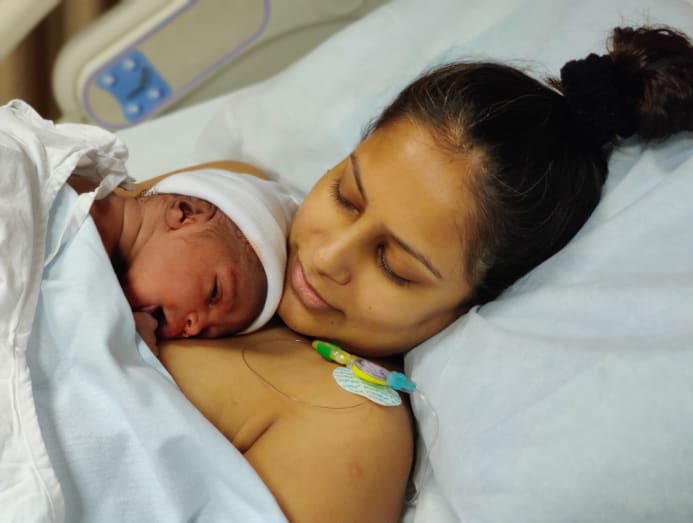
What was supposed to be precious bonding time between the new mother and her child grew into worry when Ponde noticed that one breast, her left, was “constantly” engorged.
And everything she did to treat it didn’t seem to work.
“I tried heat packs, massages, and I used to get up every two hours at night to try to (pump out my breast milk),” said Ponde.
Despite feeling something was amiss, she decided to postpone her visit to the hospital as Singapore was in its circuit breaker.
By August however, she felt it was “high time” to call in a lactation consultant to help her with her declining breast milk supply.
There was no lump, recalled Ponde, and the lactation consultant suspected that it might be mastitis, a common breast infection that nursing mothers face. She then recommended a breast doctor to Ponde.
In the same month, Ponde made an appointment with the breast doctor.
THE BREAST CANCER DIAGNOSIS
“It doesn’t look like a blocked milk duct,” Ponde’s doctor told her while reviewing her breast ultrasound results.
The doctor performed a 15-minute procedure called fine-needle aspiration biopsy, in which a small tissue or fluid from her left breast was removed with a needle attached to a syringe.
She was then sent home and asked to return in a few days to review the results.
The clinic called after a couple of days, asking her to return – and bring her husband along. “I wondered, what did she need my husband for?”
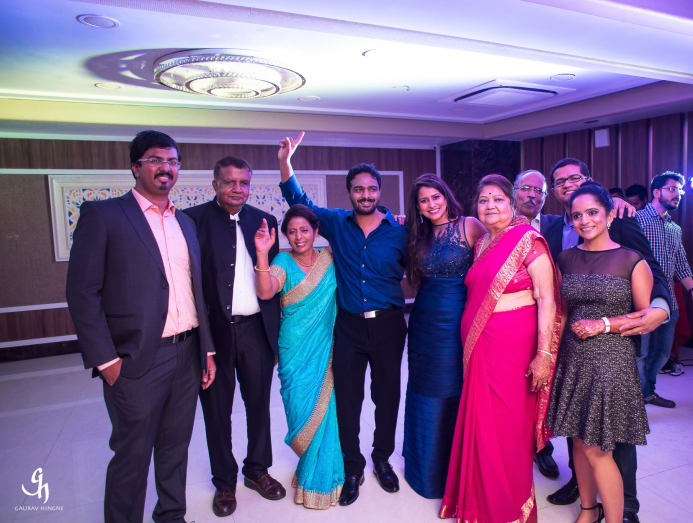
At the doctor’s, Ponde found out that she had carcinoma, a type of cancer. The American Cancer Society said on its website that most breast cancers are carcinomas, which are tumours that start in the cells that line the organs and tissues throughout the body.
“I don't remember much of that conversation because it was shocking to hear that I have cancer,” said Ponde.
She didn’t have a family history of cancer, not did she know anyone who had cancer. She was also worried about having to navigate the treatment and recovery process, including getting a second medical opinion, in a new country and environment.
PREGNANCY-RELATED BREAST CANCER
After a series of additional tests, the couple found out that Ponde had stage four inflammatory breast cancer, also known as metastatic breast cancer. This means the cancer had spread to her lungs, liver and bones.
“As soon as someone said stage four, my first thought was, I am going to die.”
Samar was only four months old then.
Completely devastated by the diagnosis, Ponde asked her doctor how she could have developed cancer. The consultant told her it could have been linked to her pregnancy as her cancer was “oestrogen-positive”.
As soon as someone said stage four, my first thought was, I am going to die.
According to Healthline.com, if you have oestrogen-positive breast cancer, your cancer cells grow in the presence of the hormone oestrogen. Oestrogen is responsible for both a woman’s physical characteristics and her reproductive system.
With a diagnosis like stage four breast cancer, which Ponde describes as something “you hear in movies”, she recounted her doctor telling her to not feel like “it’s the end of the world”.
There are good treatment options available for her, she said, with increasing advancements in the field.
“IT WAS COMPLETELY UNFAIR”
“It really seemed like a cruel joke,” Ponde said. “We were looking forward to so many things at that point: A new country, our first baby and we were three years into our marriage.”
After the diagnosis, she recalls “feeling numb for the longest time”. Without much time to think or feel anything, Ponde had to move quickly into starting chemotherapy in September.
“I honestly felt completely victimised. It was completely unfair to both of us and our baby.”
What will I look like at the end of this entire thing? What will people feel when they look at me?
She thought: Did I not exercise enough? Did I not eat well? What did I do wrong to deserve something like this?
“I remember feeling very angry. Your whole life flashes in front of you,” said Ponde.
Her body and self-esteem also took a huge hit from the chemotherapy, from her changing appearance to fatigue and nausea.
“At that point, my hair started falling out and I was bloated,” she said.
“When you see yourself every day in the mirror, you're wondering who this person is. You don't recognise this person at all.”
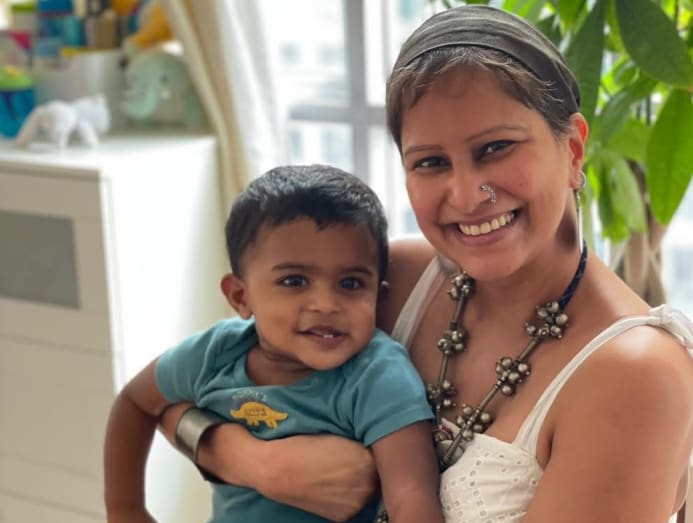
As her appearance started changing, Ponde found herself worrying about what people thought of her – and felt judged.
“I had all these fears coming up: What will I look like at the end of this entire thing? What will people feel when they look at me?”
Even though Ponde acknowledged that her feelings could just be assumptions or simply her “internal fear”, they were real to her. She found herself succumbing to fears, doubts and judgements about herself.
“I don't want people to pity me. I didn't want people to feel scared looking at me because I don't have hair, eyelashes and eyebrows.”
ACCEPTING CANCER – AND HELP FROM OTHERS
Being far from her family back in India was also tough. Ponde’s mum had passed away just before her baby was born and her dad hadn't been able to visit her because of the pandemic.
“My biggest regret is not having my immediate family come to see me,” she said.
The difficult period, however, made Ponde realise that the “people who matter” would always be there for her.
In January this year, one of her best friends Suruchi Shah, a therapist and child counsellor in India, asked if she needed help.
“I don’t need therapy. I am strong. I am good,” Ponde told her, initially rejecting her “counselling point of view”.
She eventually agreed to start therapy with Shah, and it ended up being one of the best decisions she made, Ponde told CNA Women.
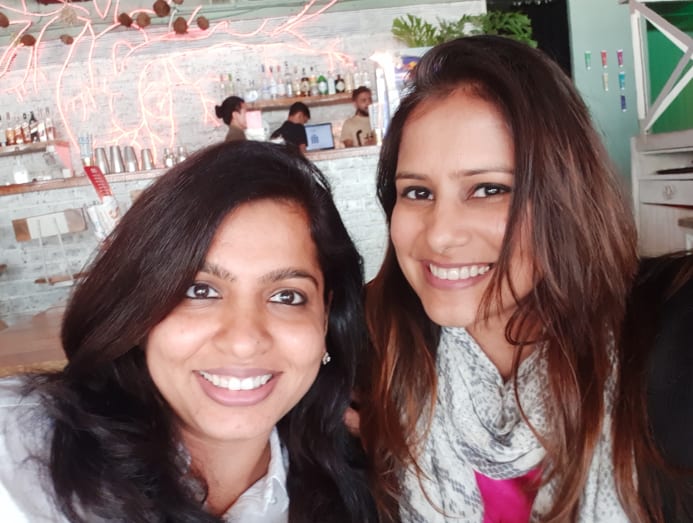
From addressing her fear of going out to meet others to removing her feelings of self-pity and judgement, Shah helped Ponde deal with her emotions in a healthy way.
“I think my biggest emotional victory at that point was that I finally accepted that I have cancer,” said Ponde.
Ponde added that she also benefited greatly from the community she found at the Breast Cancer Foundation (BCF). It’s also where she learnt that asking for help is not a bad thing.
“Reaching out to BCF was definitely a big thing, because there were a lot of answers that they already have and you don't need to start the journey from scratch,” she said.
From finding suitable doctors to helpful inputs about nutrition, chemotherapy and radiation therapy, it was a good place to start.
“It's like this sisterhood where everybody wants to protect everybody, especially for breast cancer where there’s very few people in their younger age,” said Ponde.
My biggest emotional victory at that point was that I finally accepted that I have cancer.
Being part of the group eventually inspired her to start thinking about what she wanted to do with her life – and the kind of impact she wanted to create.
“When I started asking for help, I think my world turned around, because everybody wanted to be there in their own way to help me.”
COPING WITH UNCERTAINTIES
The hardest part of dealing with cancer, Ponde said, is “not knowing where the treatment is going”.
So far, her treatment regime has consisted of chemotherapy followed by hormonal therapy and back to chemotherapy again. She has tried two different chemotherapy drugs but both didn’t work well.
“Each time we got our hopes up, when the drug started working, it stopped working and the cancer would come back,” said Ponde.
She is now on a third chemotherapy drug called doxorubicin, which she started in August.
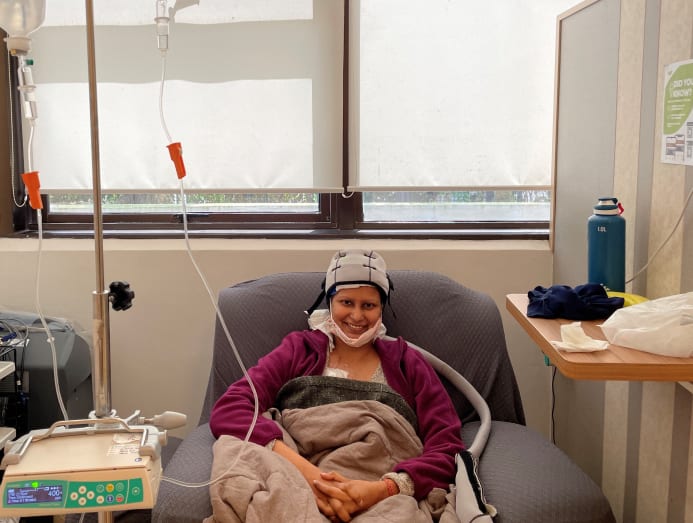
Surgery is not an option for those who have Stage 4 cancer, her doctor had told her, as the cancer cells have already spread to other parts of the body.
“I don't know when I'm going to get better. I don't know when I'm going to be able to say that I'm in remission.”
Ponde said she’s learnt to step out of her comfort zone to share her cancer journey with others.
While many choose to share their story only after they’ve completed their treatment (as cancer survivors), she told CNA Women that she wanted to share her experience while she's still in chemotherapy.
I don't know when I'm going to get better. I don't know when I'm going to be able to say that I'm in remission.
“It's so difficult for me to even talk like this, you know, putting yourself out there. But I think that my discomfort is very insignificant if I can make a difference to anyone's life,” she said.
Every chemotherapy session, which she does once every three weeks, leaves her feeling unwell for a week. Out of which, she would have to rest in bed for about three to four days.
Ponde said that her son Samar is her biggest motivation, inspiration – and distraction. “I want to be there when he goes to school, graduates, gets his first job and gets married. I want to be there for everything.”
BECOMING A LIFE COACH
Earlier in February, five months after the breast cancer diagnosis, Ponde decided she wanted to become a career and life coach after some encouragement from her husband.
“Don’t let life stop. What are you waiting for?” he told her, a statement that stuck, especially during moments where she felt overwhelmed.
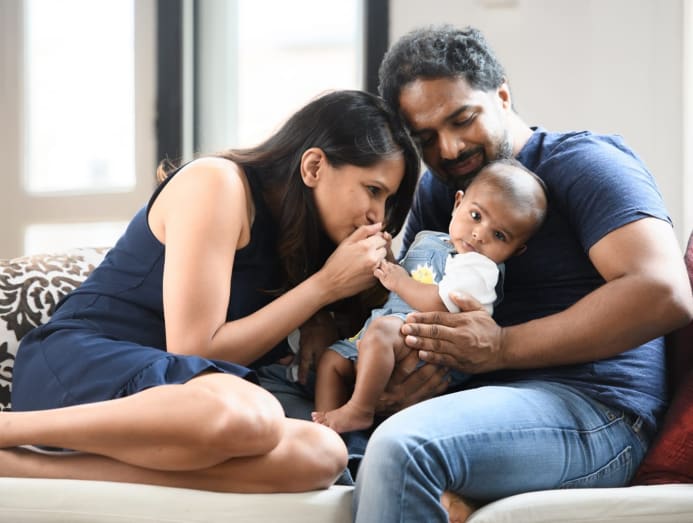
Coaching made perfect sense to her, as it was not only something that she already had some knowledge of during her previous career in HR, but would also allow her to give back.
But even then, she never thought that she’d go into it full-time – she had all along seen it as something that would be useful in her career.
She then started a course in Neuro-Linguistic Programming (NLP) in July and received her certificate in September.
As part of her journey to become a qualified coach, she is now on her way to completing 100 coaching hours by December, as part of a requirement to become an Associate Certified Coach. This is a separate certification issued by the International Coaching Federation.
It's so difficult for me to even talk like this, you know, putting yourself out there. But I think that my discomfort is very insignificant if I can make a difference to anyone's life.
“(Coaching is) another way I'm learning to give back, helping people figure their lives out,” said Ponde.
During the weeks where the side effects of her chemotherapy are more muted, Ponde tries to squeeze in about four coaching sessions a week, clocking in four hours per session. The people she coaches range from women who need career advice on returning to work to those looking for personal growth.
Even on days where she’s coaching for seven to eight hours a day, she still feels energised, she said.
Through it all, Ponde is thankful that her family has adjusted to her “regime” – which includes going for chemotherapy, coaching and light exercises such as yoga and cycling.
RELATED:
They've set themselves a schedule, she said, with her mother-in-law and helper stepping in to help take care of Samar, while her husband works through the day.
“My husband will always tell me that I need to focus on myself to heal and get better for the kind of future that I want to give Samar.”
“So, I think I just learned to be kind to myself.”
The Breast Cancer Foundation (BCF) provides resources, services and programmes for Singapore women fighting breast cancer, such as counselling, workshops related to mental health, the Young Women’s Support Group, wig loans and the volunteer befriender initiative. You can call BCF at 6356 0123 or email enquiries [at] bcf.org.sg for more information.
CNA Women is a section on CNA Lifestyle that seeks to inform, empower and inspire the modern woman. If you have women-related news, issues and ideas to share with us, email CNAWomen [at] mediacorp.com.sg (CNAWomen[at]mediacorp[dot]com[dot]sg).








